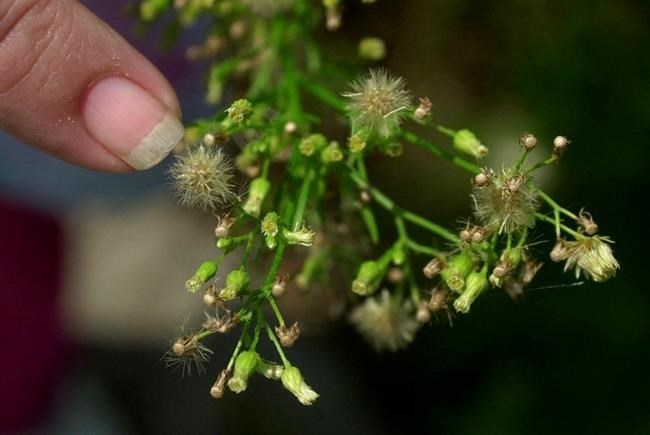
In this Aug. 14, 2001, file photo, a woman points to the pollen on a ragweed plant in Newark, N.J. You feel a sneeze coming on, or a tickle in your throat, and the alarm bells start ringing in your head. Is it seasonal allergies or is it the beginnings of a COVID-19 infection?
Image Credit: THE CANADIAN PRESS/AP/Daniel Hulshizer, File
April 29, 2020 - 5:00 AM
You feel a sneeze coming on, or a tickle in your throat, and the alarm bells start ringing in your head.
Is it seasonal allergies or is it the beginnings of a COVID-19 infection?
While springtime pollen can cause sneezing, wheezing and watery eyes in allergy sufferers, a Toronto allergist says it's best to take precautions if seasonal symptoms start presenting like those more common in COVID cases.
"There is a real risk here — or at least a real temptation — to try to minimize symptoms and brush them off and say: 'well, it's only allergy, let's see how things go,'" said Dr. Peter Vadas, the head physician at the Allergy and Immunology Clinic at St. Michael's Hospital.
"But if it turns out that it's not allergy, and you've been out and about potentially spreading this infection around, you've done an enormous disservice to the public and to yourself."
The Mayo Clinic's website says seasonal allergy, also called hay fever, causes "cold-like signs and symptoms, such as a runny nose, itchy eyes, congestion, sneezing and sinus pressure."
Hay fever isn't caused by a virus though, like the common cold or COVID-19. Rather, it's an allergic response to either indoor allergens like pet dander, or outdoor allergens that tend to ramp up around early spring.
Vadas, who's received an influx of questions about allergy symptoms in recent weeks due to the coronavirus pandemic, said that early spring brings with it two major allergens — tree pollen in the air that can travel from far distances, and outdoor mould spores caused by rain-dampened soil.
Grass pollen comes into play later in the spring, around May and June, Vadas added. He said checking the weather forecast for pollen and mould counts could help in determining whether symptoms are caused by outdoor allergens or something else.
"This time of year especially, people are expressing concern because there are some (allergy) symptoms which resemble those that we see with COVID patients," Vadas said. "So it does raise that level of anxiety. People are very attuned to this."
The major distinction between allergies and COVID-19, Vadas said, is the presence of fever that's usually associated with the coronavirus.
The Centers for Disease Control and Prevention (CDC) in the United States lists cough, shortness of breath or difficulty breathing, chills, muscle pain, headache, sore throat and a new loss of taste or smell as other common symptoms of COVID-19.
Some of those, like coughing, can overlap with hay fever.
But Vadas says to watch for multiple symptoms. If just one is present, it's likely not due to COVID-19.
"It's usually part of a constellation of other symptoms that will help to differentiate it," he said. "And the other big distinction to this is treatment.
"Antihistamines will help to a large measure in reducing or minimizing the symptoms of seasonal allergies, but they won't do anything for reducing or minimizing the symptoms related to COVID-19."
People certain their symptoms are allergy-specific still need to protect themselves against the coronavirus, Vadas said. Those with runny noses and itchy or watery eyes need to be especially cognizant about not touching their faces.
Coronavirus precautions won't protect against allergens either, he added. Cloth or surgical masks, which don't form a tight seal against the face, won't completely keep pollen out.
Vadas says seasonal allergies tend to present themselves in a similar pattern year after year. So if you experience symptoms every spring, it's probably hay fever. If you're worried that you've recently developed a pollen allergy, however, testing for it will likely have to wait until after the pandemic is over.
Most allergy clinics are closed to non-critical patients for now, so the skin tests usually done to detect hay fever aren't available. A blood test is another option, but Vadas says there are downsides to that, including long wait times for results.
"It also requires a trip to a laboratory, which isn't necessarily the best thing to do at this time," he added. "We'd like to keep people away from crowded conditions, especially health-care facilities."
Vadas says health-care workers and immunocompromised people should get tested for COVID-19 if they're worried their symptoms don't quite line up with seasonal allergies.
"I really advise against being lax about this if the situation is unclear," he said. "If somebody is working in health care or long-term care homes, or if they are high-risk ... these individuals need to take steps to find out if they do or don't have it.
"They should be calling telehealth or their family physician or go to an assessment centre to find out."
This report by The Canadian Press was first published April 28, 2020.
News from © The Canadian Press, 2020